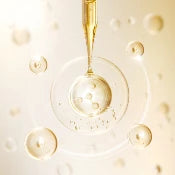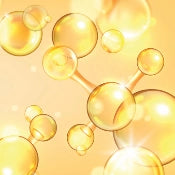As skincare moves beyond aggressive acids and harsh scrubs, a new class of exfoliants is gaining popularity: encapsulated enzymes. These bioactive proteins deliver precision exfoliation without compromising the skin barrier, making them ideal for sensitive, acne-prone, and post-treatment skin.
This blog explores the science of encapsulated enzymes, including their formulation advantages, use cases, and why they’re redefining how gentle exfoliation is achieved.
What Are Encapsulated Enzymes in Skincare?
Encapsulated enzymes are biological exfoliants stabilized within protective delivery systems, such as liposomes or hydrogel beads. They gently break down keratinized protein bonds in the outermost layer of skin, supporting smoother texture without damaging the barrier. Common cosmetic enzymes include:
Encapsulation protects enzymes from heat, pH instability, and oxidation, ensuring time-controlled release, minimal irritation, and better shelf life.
What Are the Benefits of Using Encapsulated Enzymes in Skincare?
- Non-acidic exfoliation: Ideal for acid-intolerant or reactive skin
- No barrier disruption: Preserves the skin’s lipid matrix
- Controlled release: Reduces overactivity and inflammation
- Heat + pH stable: Enables broader formulation compatibility
- Cleaner label: Enzyme activity without mechanical or acid-based exfoliants
How Do Encapsulated Enzymes Work on Skin and Scalp?
Enzymes dissolve desmosomes (protein structures binding skin cells), allowing natural shedding of corneocytes. Unlike acids that act chemically, enzymes are selective and non-inflammatory. With encapsulation:
- Activation occurs only upon skin contact.
- Formulas remain stable across broader pH and temperature ranges.
- Enzymatic action can be modulated for daily or weekly use.
Product Comparison Table: Choosing the Right Enzyme
|
Enzyme |
Best for |
Recommended Format |
|
Papain |
Face, body |
Serums, masks, scrubs |
|
Bromelain |
Sensitive skin |
Leave-on creams, gels |
|
Keratinase |
Scalp, acne-prone |
Scalp exfoliants, serums |

Recommended Dosage by Application
|
Application Area |
Papain |
Bromelain |
Keratinase |
|
Face care |
0.5–0.8% |
0.3–0.7% |
0.2–0.5% |
|
Hair/Scalp |
0.3–0.5% |
0.2–0.4% |
0.5–0.8% |
|
Lip care |
0.1–0.3% |
0.1–0.2% |
Not recommended |
|
Body care |
0.5%-1% |
0.5–1.0% |
0.4–0.6% |
Formulation Note: Lower dosages are ideal for leave-on products, while higher dosages are suitable for rinse-off masks and body polishes.
Who Are Encapsulated Enzymes Best For?
-
People with sensitive, eczema-prone, or post-treatment skin
-
Consumers avoiding acids or scrubs
-
Acne-prone users needing non-comedogenic exfoliation
-
Scalp care products for oily or flaky scalp
Also Read: The Science Behind Encapsulation: Why It’s Revolutionizing Active Delivery in Cosmetics
How to Formulate with Encapsulated Enzymes
-
pH range: 4.5–6.0
-
Add below 40°C in the post-emulsion phase
-
Use forms: Liposomal, polymer bead, or water-activated powders
-
Compatible co-actives: Panthenol, allantoin, niacinamide
-
Avoid combining with: Peroxides, high-dose AHAs/BHAs
Formulator’s Tip: Combine encapsulated keratinase with 2% lactic acid in a dual-layer mask for deep follicular cleansing without triggering inflammation.
Ideal Applications
-
Leave-on enzyme exfoliating serums
-
Wash-off enzyme masks and peels
-
Lip smoothing treatments
-
Scalp exfoliating mists or masks
- Post-acne repair systems
Regulatory & Label Claims Support
-
Suitable for sensitive skin (tested)
-
Dermatologist-recommended claims supported
-
Label claims: “non-abrasive exfoliation,” “enzyme-activated resurfacing”
-
Meets MoCRA (US), REACH (EU), and BIS (India) compliance

Frequently Asked Questions (FAQ)
Are encapsulated enzymes better than fruit enzymes?
Yes. They are more stable, consistent, and less prone to degradation.
Can I use them with acids like glycolic or salicylic acid?
Use in alternate routines or buffer pH carefully. Not advised in the same formula unless tested.
Can I use these every day?
Yes, at lower dosages. Especially bromelain and keratinase.
What’s the shelf life?
Up to 24 months when stored at 2–8°C in sealed packaging.
Are these suitable for rinse-off products?
Yes. Short-contact enzyme cleansers still show visible improvement.
Final Word: The Next Generation of Exfoliation
Encapsulated enzymes offer a high-tech, barrier-friendly approach to skin smoothing—ideal for modern clean beauty, sensitive skin, and clinical skincare applications. They give formulators the flexibility to create non-irritating, efficacy-proven exfoliators across face, body, and scalp care.











